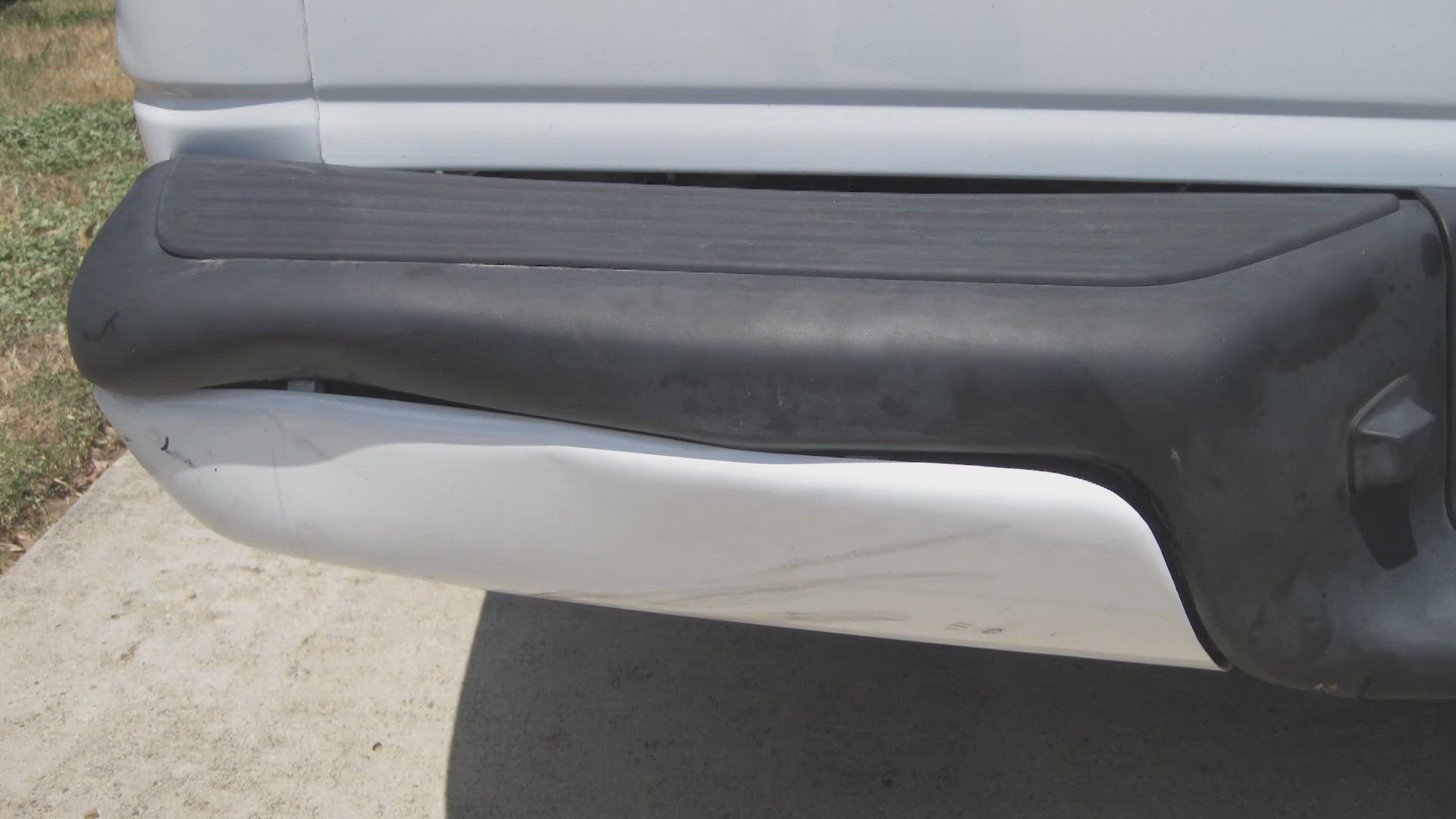SCHERTZ, Texas — Retired veteran James Rhoades was leaving Joint Base San Antonio-Randolph Air Force Base in August when another driver hit his truck from behind. The collision left a big dent in his bumper and bent a fender.
The damage was only cosmetic, and Rhoades had kept the truck in top condition since he bought it in 2001, so the veteran wanted to repair it.
"I love this truck. It's the best vehicle I've ever owned," Rhoades said. "I'm not afraid to drive it, even with all the miles on it, because of all the maintenance."
The veteran said the truck had recently been to North Carolina and South Dakota and was still running great. The driver that hit Rhoades was insured by USAA, so Rhoades started communicating with USAA about the claim and took it to a USAA shop so they could take pictures.
He also got an estimate from a car shop he already worked with and found out he would be able to repair the vehicle at his shop for only $1,100
But then, 10 days after the accident, USAA decided the accident was a "total loss" and intended to make his vehicle a "salvage vehicle."
Rhoades, who loves his truck, was not happy about this.
This meant Rhoades could either give up the truck and get a larger payment or keep the truck as a "salvage vehicle" and get a lesser payment of just under $1,900. If he kept the truck as a "salvage vehicle" it would become illegal to drive and Rhoades would need to file paperwork to get a "salvage title" and would then need to schedule a state inspection, and pass that inspection, to get it back on the road.
Rhoades did not like either of those options. He instead just fixed the truck for $1,100 and asked USAA to pay for that. USAA would not agree and the situation became contentious.
"The resolution specialist (for USAA) basically told me there were going to stand by what they said. I told her they could stand on their heads for all I cared," Rhoades said.
Rhoades then called KENS 5.
"I thought maybe a little public exposure might get them to move a little bit."
KENS 5 reached out to USAA to find out what was going on. KENS 5 also reached out to the Insurance Council of Texas and the Texas Department of Motor Vehicles to find out how these situations are supposed to work.
Insurance Council of Texas Communications Director Richard Johnson told KENS 5 a vehicle is normally "totaled" if the cost to repair the vehicle is over 60 percent of the vehicle, though some companies draw the line at 80 percent.
He also said, however, there are no set rules for when a vehicle is considered "totaled."
"It is up to the insurance company," Johnson said.
This meant there was no issue with USAA deciding the accident was a total loss.
At the same time, the Texas Department of Motor Vehicles told KENS 5, "An insurance company can declare a vehicle totaled; however, it may not meet the statutory definition of a salvage or nonrepairable vehicle. A vehicle is salvage if the damage exceeds the actual cash value of the vehicle immediately before the damage minus the cost of materials and labor for repainting the vehicle and excluding sales tax on the total cost of repairs."
This meant it was possible the truck should not be a "salvage vehicle"
KENS 5 then looked at the USAA documents showing the cash value of Rhoades' truck and the documents showing the cost of repairs.
It turns out, the truck should not be a "salvage vehicle" according to Texas law, because the cost to repair was lower than the value, and the truck should instead still be legal to drive without dealing with the DMV.
KENS 5 emailed this information to USAA and USAA then agreed they would no longer consider the truck a salvage vehicle in the claim. This meant USAA could pay Rhoades and he could continue to drive the truck.
"I can legally drive my vehicle and I don't have to go through the hassle of re-titling it and getting it re-inspected," Rhoades said.
USAA later told KENS 5 via email, "Mr. Rhoades chose to retain the vehicle, and the claim has been settled."
Rhoades said he's thankful the claim was resolved in a way that he could keep driving his truck and he's glad he called KENS 5.
"KENS 5 did a great job and a lot of research and communication with USAA," Rhoades said. "Call KENS was definitely able to help me."
If you have a problem like this, we want to help you fix it! In our series, Call KENS, we do our best to solve problems for our viewers. The number to call is 210-470-KENS, or fill out the form on this page.

